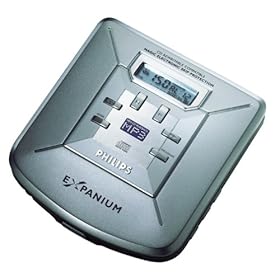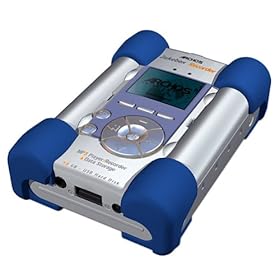I've gotten a bad rap over the years as a "gadget guy". Every time something new is released, people have come to expect me to have it. I'm definitely a gadget guy, but I think people often miss why I buy gadgets. Unlike, say, Alex, you'll rarely, if not never, see me buy something new just because it's new. I don't own an iPhone. I'm definitely an early adopter, but only when the new technology enables me to do something I couldn't do before (or makes what I could do before drastically easier).
For example, let's walk through my history with music players.
 I first had a Walkman back in the day. It was great, because I could make my own mixes and run with it. (My favorite version was the yellow Sony Sport one. It even had a sweet strap for running. Kick ass).
I first had a Walkman back in the day. It was great, because I could make my own mixes and run with it. (My favorite version was the yellow Sony Sport one. It even had a sweet strap for running. Kick ass).
Then I got a DiscMan. This enabled me to skip to the next song, something that was more tedious with cassettes. It still sucked because I had to carry a whole ton of CDs based on what I was doing and what I wanted to hear. (And let's be honest, you couldn't really run with it except on a treadmill). My experience with the DiscMan changed a lot when I get a CD burner, though. The CDs still only held 74 minutes and I had to carry a few of them, but at least they held 74 minutes of what I wanted to hear. It was less time consuming to make mixes than it was with the Walkman, the sound quality was better, and the experience was a big step forward.
 In 2000, I got a Philips Expanium, one of the first CD units that played MP3s. This was great because I really only had to carry a single CD - instead of 74 minutes, it held nearly 700 minutes. The interface wasn't great in terms of selecting music, but it was a drastic improvement. The sound quality wasn’t quite as good as a CD, but as we know now we can’t really tell the difference – and skipping wasn’t a big deal because the buffer held just about a full song. I love this thing – it was a big step forward to this point in my music consumption.
In 2000, I got a Philips Expanium, one of the first CD units that played MP3s. This was great because I really only had to carry a single CD - instead of 74 minutes, it held nearly 700 minutes. The interface wasn't great in terms of selecting music, but it was a drastic improvement. The sound quality wasn’t quite as good as a CD, but as we know now we can’t really tell the difference – and skipping wasn’t a big deal because the buffer held just about a full song. I love this thing – it was a big step forward to this point in my music consumption.
 Unfortunately, I lost my Expanium was lost in the evacuation after 9/11, so it was time to shop for something new. The iPod was still Mac-only at this point, so I decided to go with an Archos Jukebox Recorder. All of a sudden I had 6 GB of music with me everywhere. It was a bit bulky and the interface wasn't great. It had a physical hard drive (judging from the container, a full size one!), and you couldn't really run with it for an extended period of time. Another issue was that the entire interface was driven from the file system. You could browse by folder, and you could create physical playlists, but you couldn’t browse by artist, genre, or create smart playlists.
Unfortunately, I lost my Expanium was lost in the evacuation after 9/11, so it was time to shop for something new. The iPod was still Mac-only at this point, so I decided to go with an Archos Jukebox Recorder. All of a sudden I had 6 GB of music with me everywhere. It was a bit bulky and the interface wasn't great. It had a physical hard drive (judging from the container, a full size one!), and you couldn't really run with it for an extended period of time. Another issue was that the entire interface was driven from the file system. You could browse by folder, and you could create physical playlists, but you couldn’t browse by artist, genre, or create smart playlists.
For the same reason, upgrading to the iPod 15GB (third generation) was a big deal. Unlike the Archos, the iPod had a metadata-driven view of my music. All of a sudden, I had 15GB with me but I could actually sort through it - by artist, genre, etc - which I couldn't do before. Plus, it was significantly smaller, which means I was able to carry that music with me more easily in my pocket, so I listened to more music.
When the iPod Nano was first released, I bought a 4GB version. I lost 9 GB of music in the process, but it meant that I quite literally have music with me everywhere I go. I absolutely loved the nano. The size is obviously amazing, the interface is a full iPod interface, and because it was flash-based I can safely run with it without skipping or risking damage.
Still, 4GB was a bit tight - I listen to different things when I'm at the gym, programming, and just on the go - and I also got into podcasts. I found that 8GB was a good number for me, and so when the second generation Nano was released a year later I jumped on it. And yet, when I lost that 8GB Nano, I had no need to upgrade. I went back to to the 4Gb. Basically, all of my daily listening is done on my computer now (a luxury I didn't have at Goldman), so my iPod is just music for my workouts and podcasts - and 4Gb is fine. Since I don't intend on watching video, the 3G Nano brings very little to the table for me. The iPod Touch is sexy, but I don't need video, and it's more expensive and bigger. The iPod Classic has an amazing capacity, but I simply don't need 160GB with me.
And so an early adopter is still using a music player released in 2004, simply because these new products didn't transform my experience at all.
Fundamentally, this is the same reason I'm still using the T-Mobile Dash. It synchronizes completely (and wirelessly) with my Exchange Server, something the first iPhone didn't do. It is actually thinner than the iPhone. Plus, it has a full physical keyboard. And as Fraser and Jeff and others there at the end of the Firefox 3 launch party learned last week, it can beat the iPhone looking up addresses even when we give the iPhone a head start.
This isn't a new problem to most of us in the software industry. When Microsoft releases a new version of Office or Windows, they need to come up with things that will compel users to upgrade. Sometimes, a flash new look or a slick new gadget helps make the decision easier, but to be really important the new technology has to enable a use case that wasn't available previously. So, while I’m a happy Vista user and addicted to a few key features, I can understand why others are disappointed – it doesn’t really enable us to do more than we could under XP, and it doesn’t really make things that much easier for the “normal” user.
The big lesson in all of this is that technology matters when it really changes what we can do with it. For those of us building technology, it’s important to keep this in mind and not build technology for the sake of technology.
